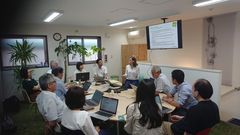On the trail of the prosumers in China and Japan
Scientist Dr. Swantje Gährs deals with energy prosumers in various projects for the IÖW. Prosumers are people who both consume and produce renewable energies. So far, her focus has been on prosumers in Germany and Europe. On a trip to China and Japan she explored the countries’ prosumer landscapes to find out how it is different to the German one. She met with scientists, NGOs, think tanks, policy consultants and citizens' initiatives in both countries and visited solar plants in Ruicheng (China), Sendai and Ueda (Japan). Japan and China are two of the largest solar energy producers in the world.
China: Prosuming is still in an early phase
The first stop on Swantje Gähr's journey was China, the country with the world's largest installed capacity of solar energy. So far, photovoltaic systems in China have mainly been installed on large open spaces, and prosuming is a new phenomenon. Only since 2013 has it been legally possible to install photovoltaic systems on roofs and feed electricity into the grid. In recent years, this type of power generation has become more interesting to the Chinese government. The reason is that the grid did not keep pace with the expansion of installed capacity. Prosuming can help to relieve the load on grids and use more energy from renewable sources.
Meetings with representatives from science, civil society and government showed that prosumers are confronted with plentiful challenges, especially in China's cities. "A large proportion of the roofs are not technically suitable for solar plants. In addition, in the cities many people live in condominiums within larger buildings. This makes it unclear who can decide whether to install solar systems on the roofs." Furthermore, decentralized power generation is economically unattractive: there are no feed-in premiums. Because Chinese electricity prices are low for private consumers, it is also not worth consuming self-generated electricity. "The government is focusing more on energy efficiency measures and large plants, than on promoting small-scale concepts for self-sufficiency". One exception is the "Solar Poverty Alleviation" programme. It is intended to help more than two million poor households to generate their own electricity and is aimed specifically at China's rural regions. The programme supports both individual and community facilities.
Together with the Beijing Energy Network, Swantje Gährs visited one of China's most modern decentralised photovoltaic systems on her trip and met with the local government and other Chinese representatives involved in local energy supply. In Ruicheng, a city in the province of Shanxi, solar and wind energy produce a surplus that also supplies the surrounding cities. In addition, the unit is also participating in a first electricity market in this province. Swantje Gährs talked with the Chinese representatives about the country’s energy transition and brought in findings from the IÖW's prosumer research.
Japan: Land of the rising sun – good times for solar energy?
Next stop on Swantje Gährs journey was Japan. Since the nuclear catastrophe in Fukushima in 2011, Japan has intensified its focus on renewable energies. Many initiatives promote a sustainable energy transition and local, decentralised energy generation. Similar to Germany, small plants with an installed capacity of less than one megawatt are widespread in Japan. Unlike in China, there is not enough space for the installation of large plants.
Innovative initiatives for renewable energies
In Tokyo, Swantje Gährs visited the Institute for Sustainable Energy Policies (ISEP). The research institute was founded in 2000 and focusses on sustainable and renewable energies, supports local renewable energy initiatives, and advises policy-makers. In Ueda, in the Nagano Prefecture, Swantje Gährs participated in a workshop organized by the Shinshu Energy Net. The associated Ueda “Citizen Energy” established a so-called "Solar Helper" programme. When homeowners decide to install a solar system, Ueda Citizen Energy helps to finance an expansion of the installed solar system so that the entire roof surface can be used. For Gährs, this is an interesting model: "It contributes to the complete use of roof areas. In Germany, too, solar systems tend to become smaller due to the attractiveness of private consumption, and part of the roof area remains unused. This financing model transfers the financial burden to many people. In addition, the specific costs decrease due to the size." Another example for successful renewable business models is Minden Energy, a provider that sells decentralised energy on the electricity market, which has been liberalised since 2015. The company uses personalized marketing: customers can directly support "their" plant and find out who the person is whose electricty production they support.
Although there are fewer prosumers in Japan, Swantje Gährs thinks that the prosumer landscape is partly comparable to the German one. "Local initiatives are working towards an energy transition, and ecologically-minded consumers are demanding more green electricity. However, the lack of political support and falling feed-in tariffs are hampering the expansion of solar energy."
Prosumer: A grassroots movement in Japan, still many obstacles in China
For Swantje Gährs it was an instructive journey. "It was interesting to see the differences and similarities between the countries: Many large renewable plants have been installed in China, but the poor grid development is forcing the government to promote decentralised systems. In Japan, the prosumers come from grass root movements." While Japan incentivises prosumers financially, prosuming is unattractive in China. "The feed-in tariff in Japan and Germany is higher than in China, although the investment costs are also significantly higher. Swantje Gährs is convinced: "Prosumers are an important component of a sustainable energy transition. They relieve the burden on electricity grids, contribute to more decentralised added value and can accelerate the expansion of renewable energies. More political support is needed in all three countries to unleash their potential."



